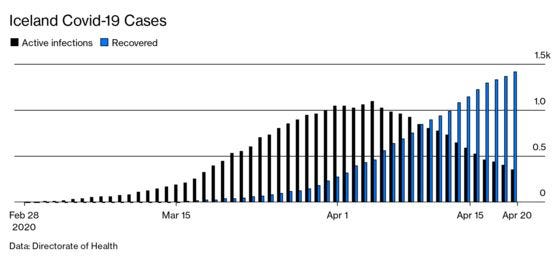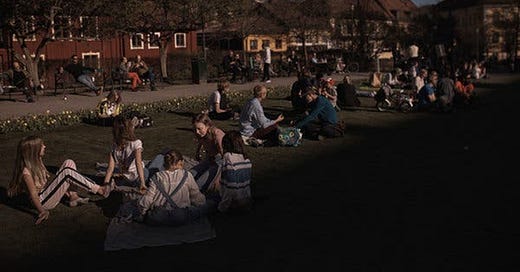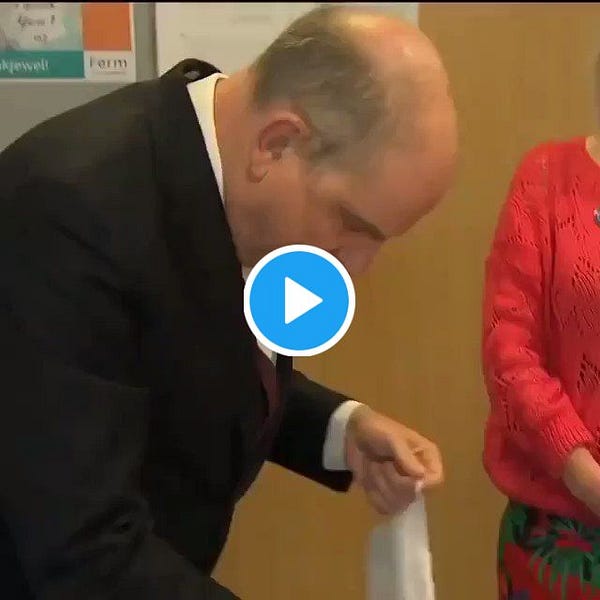A tale of 3 countries
Edition 11. What can Sweden, Iceland and Taiwan teach us? Is there a right way to hug a tree?
India has devised a complex way to segregate the country into multicoloured zones to fight the crisis. The response resembles the hapless confusion of the Deputy Prime Minister of Belgium.
Did our response have to be so rigid and top-heavy?
I wondered what we could have learned from countries that have taken a radically different path to fight this crisis.
If you have thoughts on this, I would love to discuss further.
Now, let’s get to it.
Sweden
Sweden has charted a different path compared to other Nordic countries and Western economies. In the face of rising COVID-19 cases, it has chosen to not shut down. The infographic comparing Sweden’s response to other Nordic countries is instructive

This has allowed people to mingle and stay outdoors as this New York Times photo shows.

Barring a few restrictions and government’s advisories on washing hands and maintaining social distance, life has gone about as before.
Trust is high in Sweden — in government, institutions and fellow Swedes. When the government defied conventional wisdom and refused to order a wholesale lockdown to “flatten the curve” of the coronavirus epidemic, public health officials pointed to trust as a central justification.
How has this trust played out?
Sweden’s death rate of 22 per 100,000 people is the same as that of Ireland, which has earned accolades for its handling of the pandemic, and far better than in Britain or France.

Among the top 50 infected countries, Sweden lies in the middle of the pack. So, not too bad.
But as always, statistics reveal as much as they hide.
Comparing to other Nordic countries with similarly excellent healthcare systems and low population density, Sweden does appear to be paying a price for taking this approach.

The deaths are orders of magnitude greater. Even Denmark with a population density 5x of Sweden has controlled its mortality.
Has the economy fared better?
On first glance, it seems so.

However, Sweden is a resource-rich, manufacturing heavy economy, dependent on exports. A global slowdown will impact it too, irrespective of the loose controls. The central bank of Sweden predicts that the economy could shrink by 10% this year with unemployment rising to over 13% from the current levels of <7%. A significant hit.
So why did Sweden do this?
According to Anders Tegnell, an epidemiologist at the country’s premier Public Health Agency
This is not a disease that can be stopped or eradicated, at least until a working vaccine is produced. We have to find long-term solutions that keeps the distribution of infections at a decent level.
Sweden is aiming for the long haul, ensuring that its health systems are not overwhelmed till herd immunity is reached. The crux is that it is doing so by respecting people’s freedom of movement and thinking about the second-order impact of harsh shutdowns such as the closure of schools on the health of students.
Will it work?
According to Anders again,
It is very difficult to know; it is too early, really.

Iceland
Iceland has taken a radical path during the current crisis. Its forestry service, for one, has come up with guidelines on different methods to hug a tree to tide over the loneliness of isolation.

Not being content with the creativity of its forestry services, Iceland has gone further.
A country with an ethnically homogenous population, little immigration, and ~360,000 residents, Iceland has been unique in the quantum of tests it has administered.
In the fight against the coronavirus, DeCode (a local biopharma company) has rolled out one of the world’s most extensive testing and tracking programs, helping contain the spread of Covid-19 at home and providing insights into the disease’s evolution and questions others are trying to answer.
How radical is it?

What has it found?
Two massive insights which can have implications on how we think about the virus.
Researchers identified more than 291 mutations that haven’t been spotted anywhere else, illustrating how often the virus changes as it spreads. Iceland has also shown that the number of people who carry the virus but exhibit no symptoms may be high: About half of those who have Covid-19 might be asymptomatic at any given time
A rapidly mutating virus across geographies makes it hard to find a catch-all solution.
The implication of ~50% carriers being asymptomatic is bigger. It would imply that extensive testing would be the only way out to open the economy safely and current interventions such as temperature checks would not be particularly foolproof or effective.
What has been the impact on Iceland?
Aggressive testing and contact tracing have limited the infections and mortalities (10), and allowed the country to function without lockdowns.

However, the economy seems to be suffering. Iceland has taken off as a hub of aviation and tourism over the last decade. Justin Beiber too, has contributed.
As a result, tourism alone contributes to ~10% of the Icelandic GDP. The downturn has hit the industry hard. Unemployment has soared from ~5% to over 9% in March and is on track to hit ~17% by the end of April. Over 40% of those unemployed belong to the aviation and tourism sector. Government has unleashed multiple programs to alleviate the current situation until the tourism industry stabilizes.
To summarize, the economy has not fared well, though for reasons outside Iceland’s control. On a positive note, public spaces including restaurants are still open and it looks like government restriction on mass gatherings will be lifted by early May.
However, Iceland’s approach has far-reaching implications outside its own borders. Learnings from mass testings and impact of the virus across different genes could provide the breakthrough needed to understand a disease we still know little about.
Taiwan
Officially the Republic of China, (a short YouTube explainer on how two countries have the name China), Taiwan is the biggest success story emerging out of the pandemic.
An industrial and services powerhouse, it is usually in news for a crisis in the Taiwan straits or a natural disaster.
Not this time though.
Despite being less than 80 miles away from the coast of China, it has registered 426 cases with 6 deaths. Years of international pressure from China has led to only 15 countries recognizing Taiwan as a separate country. So remarkable is Taiwan’s pandemic response that the achievement has presented it a once in a lifetime geopolitical opportunity to reassert itself diplomatically.
What did Taiwan do?
The strategy can be summarized in two words - rapid response. Lessons from the SARS outbreak in 2003 taught the government to not underestimate the crisis.
WHO was notified of a mysterious virus on 31st December 2019. By 5th January, Taiwan started screening for pneumonia-like symptoms in people who had travelled from Wuhan in the past 14 days. Quarantining and isolation measures were imposed. As cases increased, inbound international arrivals were stopped altogether by March.
Taiwan also intrinsically understood the importance of masks. Understanding that the pandemic can cause shortages, a rationing system was built allowing groups of people to buy masks on certain days.
Transparency and collaboration were prioritized. The government held daily press conferences and the media was enrolled to broadcast messages on hygiene. The private sector was enrolled to provide spaces for quarantine and civil society was pressed to ensure that the vulnerable were taken care of.
How did the economy fare?
In sharp contrast to the global economy which is undergoing a painful contraction, Taiwan stunned the world by posting a growth of 1.54% for Q12020 and an unemployment rate <4%. Compare this to China which is expected to contract by 6% or HongKong which is expecting a contraction of 10%.
Even though the global slowdown will impact Taiwan, it is a standout performer offering lessons to countries on leadership and effective crisis management.
What is common across these countries?
While the 3 countries have followed different trajectories, few things stand out.
1) Trust in government and science. These countries are high trust societies with respect for scientists, experts and institutions. A critical lesson to remember in times of populists staking validity on their personal charisma and selling snake oil.
2) Respect for people and their agency. The trust of people in institutions was repaid by the government in-turn by respecting their rights. No authoritarian lockdowns were announced; people were trusted to practice social distancing and practice hygiene measures, and life was allowed to go on as normally as possible. The economy has fared better as a result.
3) Strong welfare systems and social nets. All 3 countries have world-class social systems and health coverage. Health systems have not been overwhelmed and the impact on those vulnerable has been adroitly managed. Other rich countries with collapsing healthcare systems and poor safety nets will want to take note.
Can India learn anything?
India has taken an overtly centralized approach to fight the pandemic and it is paying a price for it. As R Jagannathan sums up
At the policy level, the central message must be deregulate, deregulate, deregulate; trust, trust, trust; empower, empower, empower.
We did not dismantle (or thought we did) the licence-permit raj in 1991 only to bring it back using the Covid-19 excuse. It is in a pandemic that deregulation is most needed. What implementers need is relevant information and resources to take appropriate protection measures on their own.
What the state must do is support and complement their efforts. Setting 13-page missives ordering people to comply has limited chance of success.
The Indian state is very good at disabling businesses and livelihoods; it now needs to develop the attitude and competence to be an enabler.
In other news
A roundup of a few interesting things I came across this week
This thread with fantastic recommendations of pieces both obscure and thought-provoking.

Exxon Mobil was once called a corporate state within the American state … one of the most powerful businesses ever produced by American capitalism. It now seems like just another mediocre business.
The US Congress announced a bailout package worth $2,000,000,000,000. How did it get so much money? An excellent Planet Money explainer.
The Chinese embassy in France has taken Twitter diplomacy to another level. In a video that has to be seen to be believed, it has fired back against Donald Trump’s charges of China spreading the coronavirus.
Yes, Twitter will end the world.
100+ subscribers get their weekly insight from this newsletter. If you like it, earn good karma by sharing it with others who might like it too. Feel free to send suggestions on twitter at @romit_ud or at romitnewsletter@gmail.com. Stay safe!







